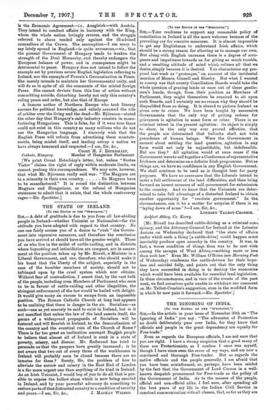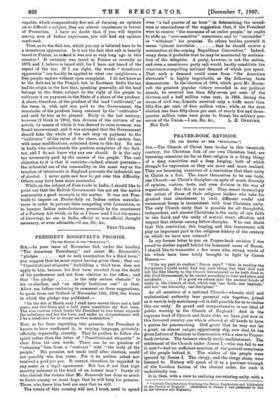THE IGNORING OF INDIA.
[TO TILE EDITOR OF THE "SPEOTATOE:q
Sin,Inthe article in your issue of November 30th on " The Ignoring of India" you say : " The advocates of Protection no doubt deliberately pass over India, for they know that officials and people in the great dependency are equally for Free-trade."
Even as regards the European officials, I am not sure that you are right. I have a strong suspicion that a good many of theni are Protectionists, as I confess I once was myself,. though I have since seen the error of my ways, and am noir', a, convinced and thorough Free-trader. But as regards the native officials and the people, generally, I am afraid 'that you have been misinformed, or, perhaps, have been misled by the fact that the GovernMent of Lord Curzon in a well; known ,despatch pronounced for Free-trade as the policy:cif tbi Government of India. As to the masses of the people, official and non-official alike, I feel sure, after spending all the best years of my life in the Indian Civil Service' in constant cOmmunication'w•ith all classes, that, so far as they are
capable, which comparatively few are,. of forming an •opinion on so difficult a subject, they are almost unanimous in favour of Protection. I have no doubt that, if you will inquire among men of Indian experience, you will find my opinion confirmed.
Then as to the Salt-tax, which you say is believed-here to be a monstrous oppression. Is it not-the fact that salt is heavily taxed in France, as indeed it was not so very long ago in this country ? It certainly was taxed in France as recently as 1878, and I believe is taxed still, for I have not heard of the repeal of the tax. If I am right, the words " monstrous oppression " can hardly be applied to what our neighbours, a free people, endure without open complaint. I do not know as to the Salt-tax in the Punjab, but in Southern India the tax had its origin in the fact that, speaking generally, all the land belongs to the State, subject to the right of the people to cultivate it on payment to the State of a share of the produce. A share, therefore, of the produce of the land "cultivated," as the term is, with salt was paid to the Government, the remainder of the produce being retained by the " cultivator " and sold by him as he pleased. Early in the last century, however (I think in 1804), this division of the outturn of an article, by means of which it was desired to raise revenue, was found inconvenient, and it was arranged that the Government should take the whole of the salt crop on payment to the "cultivator" of the value of his share, and this system has, with some modifications, subsisted down to this day. No one in India who understands the position complains of the Salt- tax, and I do not know why any one should. It is the only tax necessarily paid by the masses of the people. The real objection to it is that it restricts—indeed, almost prevents— the industrial use of the commodity, in the same way as the taxation of intoxicants in England prevents the industrial use of alcohol. I never quite saw how to get over this difficulty. Others may have been more successful.
While on the subject of Free-trade in India, I should like to point out that the British Government has not set the native community a good example in the matter. It was not Free- trade to impose an Excise-duty on Indian cotton manufac- tures in order to prevent their competing with Lancashire, or to hamper Indian manufactures generally by the enactment of a Factory Act which, so far as I know (and I had the means of knowing), no one in India, official or non-official, thought necessary, or even advisable.—I am, Sir, &c., FREE-TRADER.











































































 Previous page
Previous page